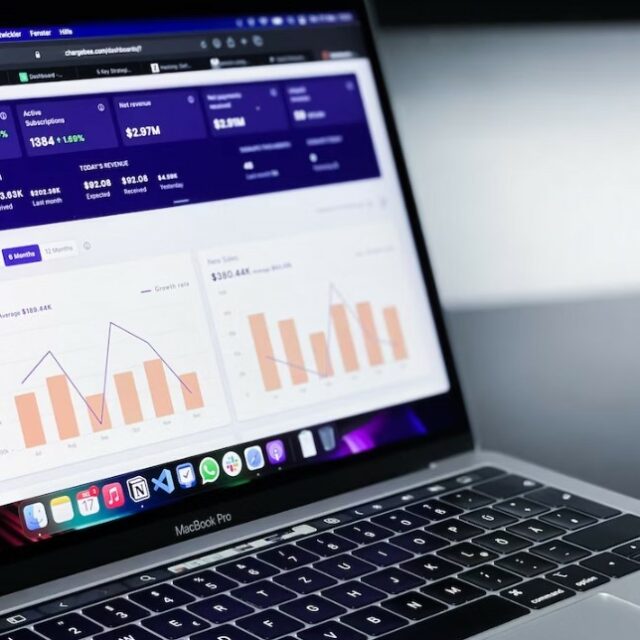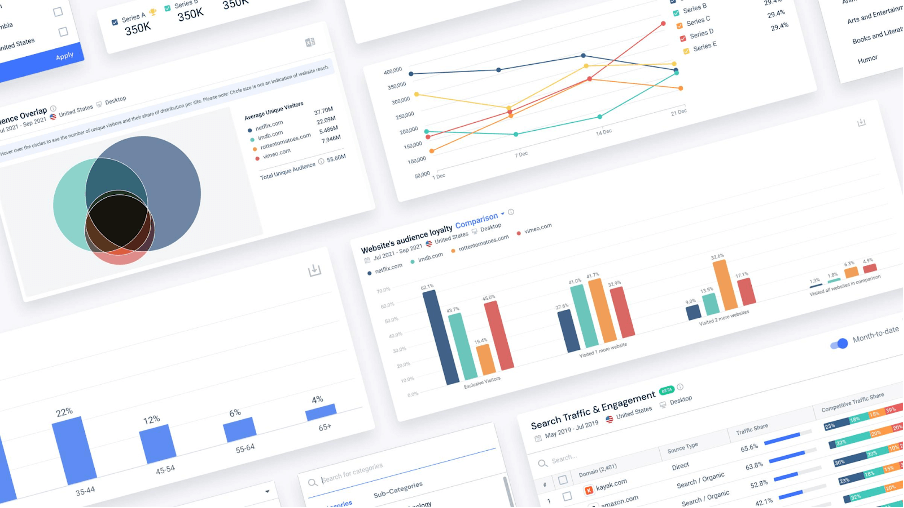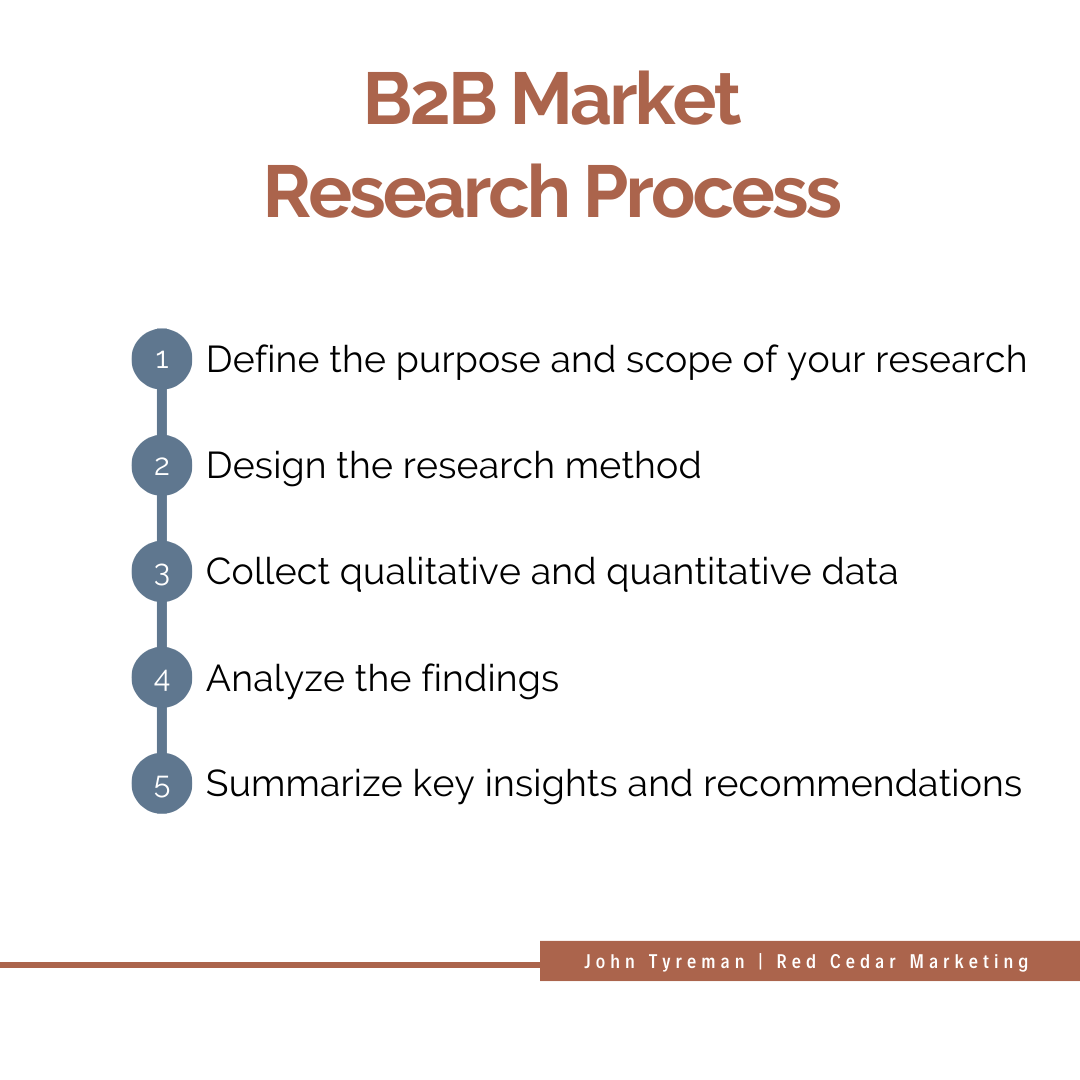In today’s cutthroat business landscape, staying ahead of the curve is paramount to success. That’s where B2B market research steps in as your secret weapon. B2B, or business-to-business, market research empowers you with invaluable insights into other businesses, enabling you to make informed decisions and craft winning marketing strategies. The significance of B2B market research cannot be emphasized enough. It unveils the behavioral patterns and preferences of your target audience, allowing you to customize your products or services to cater precisely to their needs. By conducting meticulous research, you can uncover untapped opportunities for growth, stay abreast of industry trends, and gain a competitive edge over rival companies.
Click here for our comprehensive guide on B2B market research.
There are various types of B2B market research at your disposal—each serving a unique purpose based on your goals and objectives. In the following section, we will delve deep into these different types while providing real-world examples that illustrate their effectiveness. Remember that thriving businesses thrive on knowledge and understanding. By dedicating time and resources towards comprehensive B2B market research endeavors, you can ensure that your company remains relevant amidst an ever-evolving marketplace. Stay tuned as we embark on an exhilarating journey through the realm of B2B market research!
Types of B2B Market Research
In the dynamic realm of business-to-business (B2B) marketing, market research is an indispensable tool for understanding customer needs and preferences. It empowers companies to make informed decisions and gain a competitive edge in their respective markets. To navigate this landscape effectively, it is crucial to explore the different types of B2B market research methods available, each offering unique benefits and applications.
- Surveys: Unveiling Customer Insights with Precision
Surveys are a cornerstone of B2B market research, renowned for their effectiveness in gathering valuable data from targeted respondents through questionnaires or interviews. By leveraging surveys, businesses can uncover vital information about customer satisfaction levels, product feedback, brand perception, and more. For instance, imagine a software company seeking to enhance its user experience. Through well-crafted surveys tailored to its clients’ needs, it can gather invaluable feedback on desired features or improvements while gauging overall satisfaction with the product.
- Focus Groups: Delving Deep into Consumer Sentiments
Focus groups assemble a select group of individuals who represent the target audience for a specific product or service. Guided by skilled moderators, these sessions facilitate profound discussions that delve deep into consumer opinions and attitudes. Consider an automotive manufacturer aiming to refine its design elements based on consumer preferences. By organizing focus groups comprising passionate car enthusiasts, they can glean insights regarding color schemes or interior features that resonate most strongly with potential buyers.
- Interviews: Illuminating Perspectives from Experts
In-depth interviews foster one-on-one conversations between researchers and participants to extract detailed insights about specific topics or issues related to a business’s products or services. Suppose you’re part of a consulting firm eager to stay ahead of emerging trends within your industry niche. Conducting interviews with seasoned industry experts allows you access to invaluable expert opinions that shed light on new developments shaping your field’s future trajectory.
- Observational Research: Unveiling Customer Behavior in Action
Observational research entails discreetly observing customers’ behaviors in real-life situations without direct interaction or intervention from researchers. This method provides businesses with a unique opportunity to understand how customers naturally interact with their products or services. Imagine you’re a retail store owner seeking to optimize your layout and boost sales performance. By employing observational research techniques, such as monitoring shoppers’ behavior patterns within different sections of the store, you can gain valuable insights that inform strategic decisions aimed at enhancing customer experience and driving revenue growth.
These four types – surveys, focus groups, interviews, and observational research – represent just a glimpse into the vast array of methods available for conducting B2B market research. Each method offers distinct advantages tailored to specific business goals and objectives. By harnessing these diverse market research tools effectively, companies can unlock invaluable insights into their customers’ needs and preferences. Armed with this knowledge, businesses can make data-driven decisions that lead to improved products/services, heightened customer satisfaction levels, and ultimately thrive amidst today’s fiercely competitive marketplace.

Implementing B2B Market Research
Implementing B2B market research is an essential strategy for businesses looking to gain a competitive edge in today’s dynamic markets. By conducting thorough and targeted research, you can uncover valuable insights about your customers, identify emerging trends, and make informed business decisions. In this expert guide, we will walk you through the key steps to effectively implement different types of B2B market research.
- Define Your Research Objectives: Before embarking on any research project, it is crucial to clearly define your objectives. Ask yourself what specific questions or problems you need answers to through market research. This will serve as a compass throughout your entire research process.
- Choose the Right Methodology: There are various methodologies available for conducting B2B market research, each with its own strengths and limitations. From surveys and interviews to focus groups and data analysis tools, selecting the right methodology that aligns with your objectives is paramount for accurate data collection.
- Develop a Comprehensive Research Plan: A well-structured plan is vital for the successful implementation of B2B market research. Outline each step of your project in detail – from data collection methods to timelines and resource allocation – ensuring clarity and accountability within your team.
- Collect Data from Reliable Sources: To obtain meaningful insights, gather relevant data from reliable sources such as industry reports or customer databases. Utilize both primary (directly collected) and secondary (existing) data sources for a comprehensive understanding of the marketplace.
- Analyze Data Effectively: Once you have gathered all the necessary information, it’s time to analyze it meticulously using statistical techniques or qualitative analysis methods tailored to suit the nature of your study. Look beyond surface-level findings; seek patterns or trends that can inform strategic decision-making within your organization.
- Interpret Results Strategically: Transform raw data into actionable insights by interpreting findings in relation to initial objectives and business goals. Identify key takeaways that can drive impactful strategies moving forward, helping your company stay ahead of the competition.
By following these expert steps and addressing common challenges head-on, you can effectively implement different types of B2B market research in your business strategy. Remember that ongoing research is vital for maintaining a competitive edge in today’s ever-changing business landscape.
Measuring the Success of Your B2B Market Research
Understanding the impact of your B2B market research is vital for your business’s success. By carefully analyzing and interpreting the results, you can gain valuable insights that will shape future decision-making and keep you ahead in today’s fiercely competitive business landscape.
Key Performance Indicators for Effective B2B Market Research:
- Customer Satisfaction: One crucial metric to measure is customer satisfaction. This can be accomplished through surveys or feedback forms, where customers rate their experience with your products or services. Tracking changes in customer satisfaction over time allows you to pinpoint areas for improvement and ensure that your offerings consistently meet their needs.
- Brand Perception: Another essential indicator is brand perception. It involves evaluating how customers perceive your brand compared to competitors in terms of quality, reliability, innovation, and other relevant factors. Surveys and focus groups serve as powerful tools for gathering this invaluable information.
- Market Share: Monitoring market share provides insights into how well your business performs relative to competitors within a specific industry or market segment. Analyzing changes in market share over time helps evaluate the effectiveness of your marketing strategies and identifies potential growth opportunities.
- Return on Investment (ROI): Calculating the ROI of your B2B market research efforts determines whether they generate a positive return for your company. By comparing costs incurred with benefits gained from implementing research findings, you can assess if investing resources into these activities was worthwhile.
Analyzing and Interpreting Results Effectively:
- Data Analysis Tools: Utilize data analysis tools like spreadsheets or statistical software programs to efficiently organize and analyze collected data. These tools enable you to identify patterns, trends, correlations, and outliers that offer valuable insights into customer behavior or preferences.
- Comparative Analysis: Compare current results with previous benchmarks or industry standards to gauge performance improvements or areas requiring attention within your organization. This enables the identification of strengths and weaknesses so that informed decisions can be made for future strategies.
- Qualitative Analysis: In addition to quantitative data, qualitative analysis is crucial for understanding the “why” behind the numbers. Conduct interviews or focus groups with key stakeholders to gain deeper insights into customer motivations, pain points, and preferences.
- Actionable Recommendations: Based on your analysis, develop actionable recommendations that address identified areas of improvement or capitalize on opportunities. These recommendations should be specific, measurable, achievable, relevant, and time-bound (SMART) goals aligned with your business objectives.
By effectively evaluating the impact of your B2B market research efforts and interpreting the results in a meaningful way, you can optimize decision-making processes within your organization and drive sustainable growth.
Future Trends in B2B Market Research
In this ever-evolving business landscape, staying ahead of the curve is crucial for businesses looking to thrive. B2B market research continues to evolve, and understanding future trends is essential for maintaining a competitive edge. Here are some key trends to watch out for:
- Artificial Intelligence (AI) and Machine Learning: AI and machine learning technologies are revolutionizing the way businesses conduct market research. These technologies can analyze vast amounts of data, identify patterns, and provide actionable insights in real time.
- Big Data Analytics: With the increasing availability of data, businesses can leverage big data analytics to gain deeper insights into customer behavior, market trends, and competitive intelligence. This allows for more accurate decision-making and targeted marketing strategies.
- Mobile Research: As mobile usage continues to rise, conducting market research through mobile platforms becomes increasingly important. Mobile surveys, in-app feedback, and location-based research methods enable businesses to gather data from customers on the go.
- Social Media Listening: Social media platforms provide a wealth of information about customer preferences, opinions, and trends. By actively listening to social media conversations, businesses can gain valuable insights and adapt their strategies accordingly.
- Virtual Reality (VR) and Augmented Reality (AR): VR and AR technologies offer immersive research experiences, allowing businesses to gather data in simulated environments. This can be particularly useful for product testing, concept validation, and understanding customer preferences.
By embracing these future trends in B2B market research, businesses can stay ahead of the competition, make data-driven decisions, and drive sustainable growth in an ever-changing business landscape.
Understanding what drives your buyers and utilizing effective research methods can lead to data-driven decisions that propel your company toward sustainable growth. So, don’t miss out on the opportunity to stay ahead of the competition and unlock new possibilities for your business.








